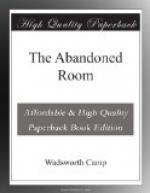Robinson pointed to the stairs.
“Get him down,” he said to Rawlins.
“He wouldn’t have gone to bed,” Graham suggested. “Suppose he’s in the old room where Howells lies?”
But Rawlins found him nowhere upstairs. With an increasing excitement Robinson joined the search. They went through the entire house. Paredes was no longer there. He had, to all appearances, put a period to his unwelcome visit. He had definitely disappeared from the Cedars.
His most likely exit was through the kitchen door which was unlocked, but Jenkins who had returned to his room had heard no one. With their electric lamps Robinson and Rawlins ferreted about the rear entrance for traces. The path there was as trampled and useless as the one in front. Rawlins, who had gone some distance from the house, straightened with a satisfied exclamation. The others joined him.
“Here’s where he left the path right enough,” he said. “And our foreigner wasn’t making any more noise than he had to.”
He flashed his lamp on a fresh footprint in the soft soil at the side of the path. The mark of the toe was deep and firm. The impression of the heel was very light. Paredes, it was clear, had walked from the house on tiptoe.
“Follow on,” Robinson commanded. “I told this fellow I wanted to question him. I’ve scared him off.”
Keeping his light on the ground, Rawlins led the way across the clearing. The trail was simple enough to follow. Each of the Panamanian’s footprints was distinct. Each had that peculiarity that suggested the stealth of his progress.
As they continued Bobby responded to an excited premonition. He sensed the destination of the chase. He could picture Paredes now in the loneliest portion of the woods, for the trail unquestionably pointed to the path he had taken that afternoon toward the stagnant lake.
“Hartley!” he said. “Paredes left the house to go to the stagnant lake where I fancied I saw a woman in black. Do you see? And he didn’t hear the crying of a woman a little while ago, and when we told him he became restless. He wandered about the hall talking of ghosts.”
“A rendezvous!” Graham answered. “He may have been waiting for just that. The crying may have been a signal. Perhaps you’ll believe now, Bobby, that the man has had an underhanded purpose in staying here.”
“I’ve made too many hasty judgments in my life, Hartley. I’ll go slow on this. I’ll wait until we see what we find at the lake.”
Rawlins snapped off his light. The little party paused at the black entrance of the path into the thicket.
“He’s buried himself in the woods,” Rawlins said.
They crowded instinctively closer in the sudden darkness. A brisk wind had sprung up. It rattled among the trees, and set the dead leaves in gentle, rustling motion. It suggested to Bobby the picture which had been forced into his brain the night of his grandfather’s death. The moon now possessed less light, but it reminded him again of a drowning face, and through the darkness he could fancy the trees straining in the wind like puny men. Abruptly the thought of penetrating the forest became frightening. The silent loneliness of the stagnant lake seemed as unfriendly and threatening as the melancholy of the old room.




